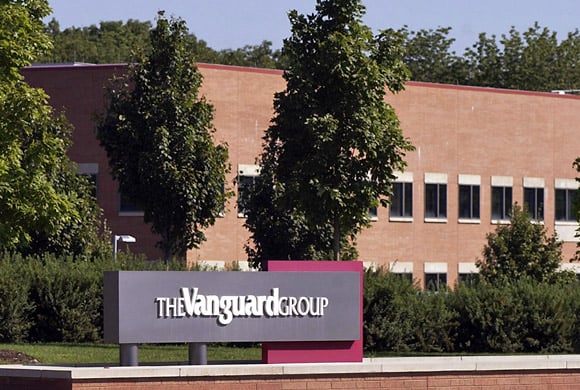Vanguard reduces its rake for two million customers. The move, says one fund industry watcher, 'puts some heat' on rival Fidelity.
Vanguard Group Inc. cut fees for almost 2 million investors as it seeks to attract clients from higher-cost competitors and extend its lead as the largest U.S. mutual-fund company by assets.
Vanguard reduced the minimum investment required to get the lowest fees for 52 funds, the Valley Forge, Pennsylvania-based company said today in a statement. The changes will cut fees on $90 billion of assets by about $100 million annually, Rebecca Katz, a Vanguard spokeswoman, said today in an interview.
Vanguard this year unseated Fidelity Investments as the biggest mutual-fund company by assets, largely on deposits made by investors into low-cost index funds. Assets in even cheaper exchange-traded funds have also surged. Vanguard, which popularized passive investing under founder John Bogle, manages $764 billion, or about 58 percent of its assets, in index funds, according to Katz.
“It certainly puts some heat on Fidelity,” Dan Wiener, editor of Independent Adviser for Vanguard Investors, a New York-based newsletter, said in an interview. Indexing “is really the new funds battleground.”
Fidelity has sought to win clients from Vanguard, saying on its website that its Spartan series index funds are cheaper, with expense ratios of 0.1 percent, when matched against Vanguard equivalents and industry averages.
Vanguard clients investing at least $10,000 in some similar funds saw their expense ratios fall today to 0.07 percent from 0.15 percent. Previously, the fee applied only to Vanguard investors with at least $100,000 in a fund.
Fidelity clients must invest $100,000 to qualify for expense ratios of 0.07 percent in Spartan funds.
“Fidelity retail mutual funds consistently rank against their Morningstar peers as among the lowest-priced mutual funds,” Vincent Loporchio, a Fidelity spokesman, said in an e- mail. “We have always made it a top priority to offer our customers competitive pricing and outstanding value.”
Passively managed funds account for 20 percent of all U.S. equity funds, up from 15 percent in 2000, according to research firm Morningstar Inc. in Chicago.
“In an environment when bonds yields are less than 3 percent and equity returns, broadly, are in the single digits, at best, controlling costs are becoming more crucial to investment success,” Morningstar analyst Dan Culloton said.
Vanguard also reduced the low-fee threshold to $50,000 for actively managed funds.
Its funds pulled in an estimated $48.8 billion in net deposits this year through August, according to Morningstar. That compares with net withdrawals at its two largest rivals, Los Angeles-based Capital Group Cos., manager of the American Funds, and Fidelity Investments of Boston.
Vanguard ETFs have drawn a net $22.6 billion this year to reach $113 billion, compared with $13.1 billion attracted by BlackRock, whose iShares ETF series has nearly three times as much in assets as Vanguard ETFs.
The average asset-weighted expense ratio for Vanguard's lowest-priced mutual fund share class is 0.16 percent, compared with 0.17 percent for its exchange-traded funds. Investors in the next cheapest share class of mutual funds pay an average 0.27 percent.







